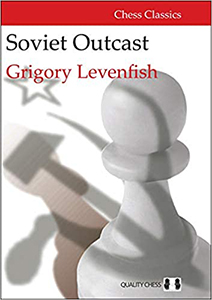Soviet Outcast
The Life and Games of Grigory Levenfish
Douglas Griffin, Jacob Aagaard

Soviet Outcast: The Life and Games of Grigory Levenfish is part of the Quality Chess Classic series which consists primarily of newly translated masterpieces from the glory days of Soviet Chess. This particular volume is based on Grigory Levenfish’s Izbrannye Partii i Vospominanie (Selected Games and Reminiscences), but is much more than that.
The personal project of the noted Russian translator and chess historian Douglas Griffin, this book contains many extra games annotated by Levenfish that did not appear in the original paperback edition published in the Soviet Union in 1967. Other extras one has come to expect from Quality Chess books include a 30-page essay by Grandmaster Jacob Aagard examining Levenfish’s career in a modern light, crosstables of his most important tournaments and biographical details not found in the original work.
Grigory Levenfish was born in 1889 near the city of Łódź and spent part of his youth in Lublin before moving to St. Petersburg to attend university. It was there he first gained widespread attention when he won the city championship in 1909. Two years later Levenfish made his international debut at Carlsbad which was also his last tournament outside of Russia/Soviet Union.
The cause for this was two-fold: The First World War and the Soviet Revolution. The latter led to a huge chess boom in the newly founded Soviet Union, but the change of government did not benefit Levenfish. Despite many excellent results in the national championship and a drawn match with Botvinnik in 1937 he never enjoyed the support the “Patriarch” received. Alone among top Soviets players he never received a stipend, working most of his life as a chemist.
Besides many well-annotated games Soviet Outcast: The Life and Games of Grigory Levenfish contains his reminiscences including his recollections of playing Alekhine dozens of training games when the future World Champion was on his way up just before World War One. There are many interesting tidbits sprinkled throughout this book including Levenfish’s insights on Rubinstein, Capablanca and Lasker.
The memories are not always great, but Levenfish manages to keep his sense of humor, as can be seen in his reminiscences about the All-Russia Olympiad (subsequently considered to be the 1st USSR Championship) held in 1920 in dire economic times.
The organization of supplies for the participants of the Olympiad was no easy matter. The accommodation in the dormitory was ‘full board’. Alas, in those difficult years for the republic it consisted of two hundred grams of bread, and one meal – lunch. For first course we were given soup made of herring heads. For the second – herring tails. Where the middle parts of the herring were, we did not manage to establish…
Levenfish is remembered as not only as a world top ten players in the 1930s, but also for also writing two very important books. Smyslov is given as the co-author of Rook and Pawn Endings but according to him Levenfish did the lion’s share of the work.
Less known is that Levenfish was the father of the Encyclopedia of Chess Openings series. In the late 1930s he began work on a predecessor to the famous opening monographs called Sovremenniy Debut. His work, on what was to be a three-volume series, is described at length in Soviet Outcast: The Life and Games of Grigory Levenfish. The Second World War ended the project after the first book, but according to the late IM Nikolay Minev this work provided the foundation for much of the older 1.e4 e5 theory in the first edition of Volume C of ECO which came out in the 1970s.
Soviet Outcast: The Life and Games of Grigory Levenfish is a great edition of a book that deserves to be called a classic.
